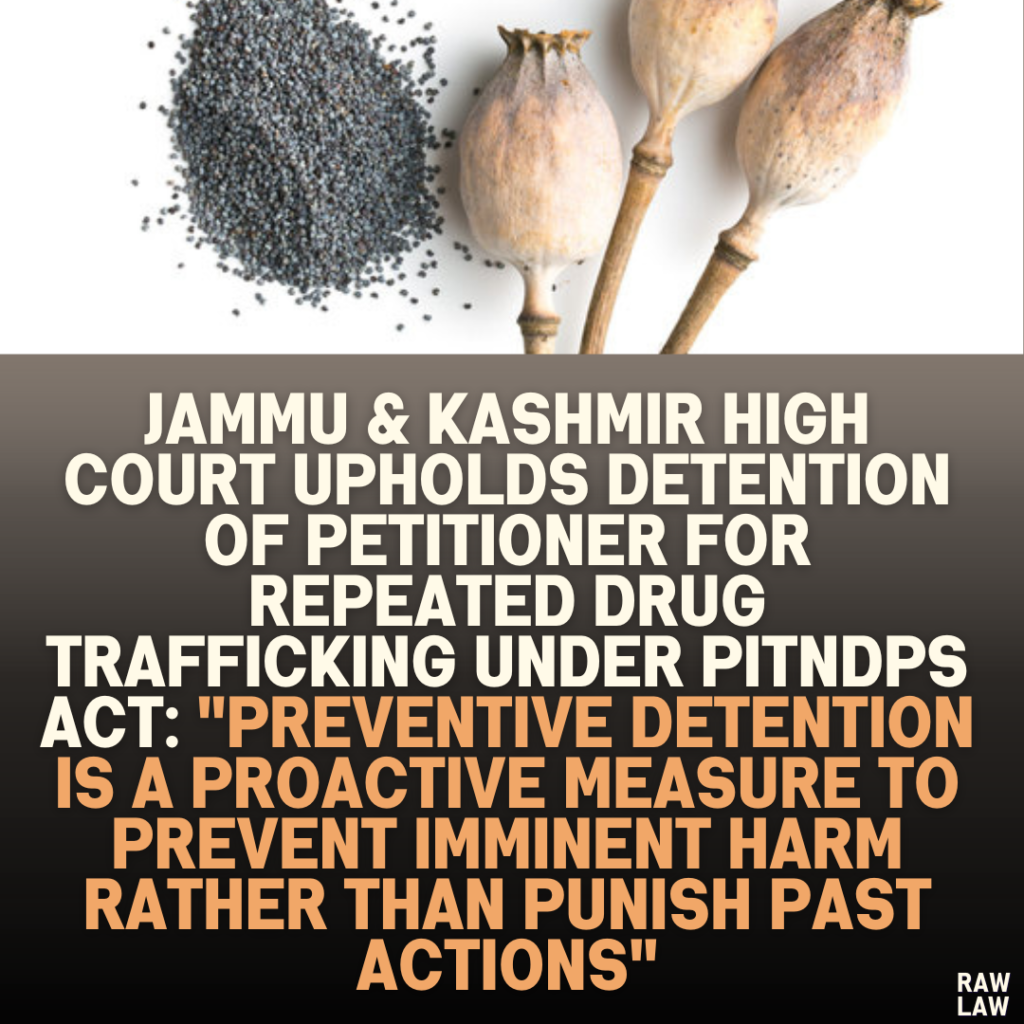Court’s Decision
The Jammu and Kashmir High Court dismissed the petitioner’s plea, affirming the validity of the detention order issued under the Central PITNDPS Act. It clarified that the detention was justified based on the petitioner’s repeated involvement in drug trafficking, which posed a significant threat to public health, societal welfare, and national security. The court emphasized the preventive nature of the detention, aiming to avert potential harm rather than punish for past actions.
Facts
- Detention Background:
- The petitioner was detained under the PITNDPS Act by the Divisional Commissioner, Kashmir, for alleged involvement in trafficking 70 kg and 25 kg of poppy straw in two separate FIRs.
- He had been granted bail in both cases but was subsequently detained under preventive detention laws due to his continued engagement in drug trafficking activities.
- Challenging the Detention:
- The petitioner argued that the detention order was issued under a repealed state law and lacked jurisdictional basis.
- He contended that there was no fresh evidence of illegal activities post-bail to justify preventive detention.
- Respondent’s Stand:
- The government asserted that the PITNDPS Act was validly extended to Jammu and Kashmir following the 2019 reorganization.
- They argued that the detention was necessitated by the petitioner’s ongoing threat to public safety and societal stability.
Issues
The court addressed the following questions:
- Was the Divisional Commissioner authorized to issue the detention order under the Central Act?
- Did the definition of “appropriate government” under the Central Act encompass Union Territories?
- Was the Central PITNDPS Act validly applied in Jammu and Kashmir post-reorganization?
- Did the Advisory Board for detention comply with legal requirements after reorganization?
- Was the detention order valid despite the petitioner’s release on bail in earlier cases?
Petitioner’s Arguments
- The detention order was issued under a repealed state law, making it invalid.
- The Divisional Commissioner was not empowered to issue detention orders under the Central Act.
- The Advisory Board for detention had not been properly reconstituted under the new legal framework.
- No fresh evidence indicated continued illegal activities after bail, undermining the detention order.
Respondent’s Arguments
- The Divisional Commissioner was authorized under a valid notification issued under the Central Act.
- The PITNDPS Act was applicable to Jammu and Kashmir following the 2019 reorganization.
- The detention order was based on sufficient evidence of the petitioner’s propensity for repeated drug trafficking.
- Preventive detention laws were necessary as regular legal mechanisms were inadequate to address the threat posed by the petitioner.
Analysis of the Law
The court examined the following legal provisions and judgments to address the issues:
- Authorization of the Divisional Commissioner:
- Under the PITNDPS Act and the Jammu and Kashmir Reorganization Act, 2019, the Divisional Commissioner retained authority to issue detention orders.
- Notifications issued prior to reorganization were deemed valid under the Central Act unless explicitly superseded.
- Applicability of the PITNDPS Act:
- The PITNDPS Act was extended to Jammu and Kashmir through the 2019 Reorganization Act, making it fully applicable.
- Nature of Preventive Detention:
- Preventive detention is a proactive measure to prevent imminent harm rather than punish past actions. The court emphasized its distinction from criminal proceedings, which require proof beyond a reasonable doubt.
Precedent Analysis
The court referred to key judgments:
- Haradhan Saha v. State of West Bengal (1975):
Preventive detention is based on a reasonable prognosis of future behavior, distinct from punitive actions. - Union of India v. Paul Manickam (2003):
Preventive detention is justified in cases of credible evidence of threats to national security or public health. - Happy Singh v. Union of India (2023):
Highlighted the detrimental impact of narcotics trafficking on national security and public health. - Pesala Nookaraju v. State of Andhra Pradesh (2023):
Reinforced that preventive detention aims to prevent future acts based on reasonable anticipation of harm.
Court’s Reasoning
The court upheld the detention order, finding the following:
- The Divisional Commissioner was authorized to issue the detention order under existing legal frameworks.
- Preventive detention laws, by their nature, focus on future risks rather than past actions.
- The petitioner’s continued association with narcotics trafficking justified the preventive detention.
- Bail in prior cases did not preclude detention, as preventive laws operate independently of criminal proceedings.
Conclusion
The court dismissed the petition, affirming the detention order as lawful and necessary. It ruled that the petitioner’s activities posed a persistent threat to public safety, health, and societal stability, warranting the use of preventive detention.
Implications
- Reinforcement of Preventive Detention:
The judgment underscores the applicability of preventive detention laws in Jammu and Kashmir post-reorganization, even under transitional legal frameworks. - Public Safety and National Security:
It affirms the state’s authority to detain individuals whose actions threaten societal welfare and public order, even if traditional legal mechanisms prove insufficient. - Clarification of Legal Frameworks:
The judgment clarifies the continuity of authorizations and the applicability of Central laws in Union Territories following reorganization.



